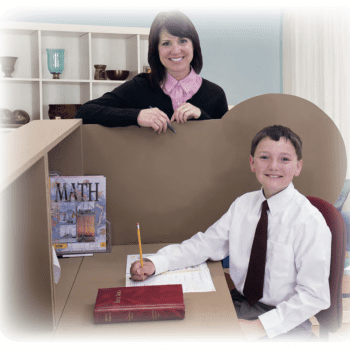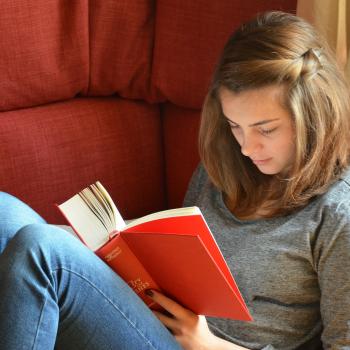I was homeschooled from kindergarten through high school. My parents started out homeschooling me because they felt I was too young to be sent to school, and ended up homeschooling me for religious reasons. Over the course of my childhood, homeschooling went from being an educational option to being a religious mandate.
My parents were very active in our local homeschool community, which was quite large. They were on the board of a regional homeschool group for a while, and organized more than one large regional homeschool convention. For years now, new homeschool families in the area have been referred to my parents for direction.
I grew up involved in a variety of homeschool co-ops and classes. There was a music co-op at one point, a co-op which tackled a different subject each year, a field trip group, a speech and debate club, and an apologetics class. For a time I had a Latin tutor, and I also took piano lessons. This was all on top of AWANA (Bible club) and the church-based children’s choir we were involved in. In fact, there were so many activities out there that my parents were always trying to cut down to keep our schedules manageable.
Once I reached high school, I did all of my studies on my own. My mother would hand me a textbook and tell me to complete it over the course of the coming year, and I would. I taught myself math, science, languages, English, history, etc., all completely on my own. Depending on the subject, I would take the periodic tests that came with the textbook or curriculum set and then give the grades to my mother, who would record them and put my final grade in my transcript at the end of the year. Some subjects, like math and science, had textbooks. Others, like English and history, did not.
 After high school, I moved on to college at a state school, on scholarships. I excelled academically. I realized that there were some serious holes in my curriculum – while I read a great deal and filled out numerous grammar workbooks, I had never actually taken a literature or English class, and while I had always studied history on my own time because I enjoyed it, there were wide geographical and chronological swaths I had completely missed – but these deficiencies never actually held me back. I also realized that my conceptual understanding of math and science had been stunted both by my lack of actual teachers and by my use of creationist textbooks. However, I wasn’t going into a field involving either math or science. Additionally, one thing that helped me achieve in college was that I was ready to ask for help when I, say, needed to write a research paper and realized I had literally no idea how to compose a footnote. There was also the value my parents had always placed on education, on lifelong learning, and my own innate hyper-motivation.
After high school, I moved on to college at a state school, on scholarships. I excelled academically. I realized that there were some serious holes in my curriculum – while I read a great deal and filled out numerous grammar workbooks, I had never actually taken a literature or English class, and while I had always studied history on my own time because I enjoyed it, there were wide geographical and chronological swaths I had completely missed – but these deficiencies never actually held me back. I also realized that my conceptual understanding of math and science had been stunted both by my lack of actual teachers and by my use of creationist textbooks. However, I wasn’t going into a field involving either math or science. Additionally, one thing that helped me achieve in college was that I was ready to ask for help when I, say, needed to write a research paper and realized I had literally no idea how to compose a footnote. There was also the value my parents had always placed on education, on lifelong learning, and my own innate hyper-motivation.
What was not so pleasant about the move to college was, well, everything outside of the academics. The school was quite a distance from home, so I lived in the dorms. Everything, and I mean everything, was a shock. The first year was extremely difficult. I broke down into tears more times than I want to remember. What rescued me is that I made some evangelical friends who, while they hadn’t been homeschooled themselves, were willing to humor my strange homeschooled ways. They might tease me for my ignorance on this subject or that, or poke fun at my fear of this situation or that, or be baffled by my complete and utter awkwardness and lack of any understanding of how to carry myself in common social situations, but all of that was combined with a sense of acceptance that I desperately needed at the time.
My parents did not go off the grid or keep me from every having friends. In contrast, we were extremely integrated into our local homeschool community and I had plenty of friends. Some years we actually had a different activity every night of the week. All of that, however, did not in any sense at all give me the social background and competence I needed to navigate college.
 Yet in spite of this, during college and for some years after I touted homeschooling as the absolute best form of education, indeed, the only real legitimate option. I had always been taught to see homeschooling as some sort of magic fix for the problems children face in today’s world, and for the challenges besetting our educational system in a changing economy. I saw it as some sort of perfect panacea, and I was an uncritical devotee. This despite my social awkwardness and my educational gaps. But there were little things in the back of my mind that niggled at me. Why was it that many of my college friends were just as smart and creative and hard working as I even though they had attended public schools? Why was it that I never quite felt that I fit in, and always felt like the odd one out? And what about the stories I began hearing of homeschoolers who slipped through the cracks, or who were involved in their homeschool communities but simply didn’t receive the same quality academic education that I did?
Yet in spite of this, during college and for some years after I touted homeschooling as the absolute best form of education, indeed, the only real legitimate option. I had always been taught to see homeschooling as some sort of magic fix for the problems children face in today’s world, and for the challenges besetting our educational system in a changing economy. I saw it as some sort of perfect panacea, and I was an uncritical devotee. This despite my social awkwardness and my educational gaps. But there were little things in the back of my mind that niggled at me. Why was it that many of my college friends were just as smart and creative and hard working as I even though they had attended public schools? Why was it that I never quite felt that I fit in, and always felt like the odd one out? And what about the stories I began hearing of homeschoolers who slipped through the cracks, or who were involved in their homeschool communities but simply didn’t receive the same quality academic education that I did?
At some point I began to delve into scholarly writing on the subject of homeschooling. I read Mitchell Stevens’ Kingdom of Children and Milton Gaither’s Homeschool: An American History. And then, later, I read Robert Kunzman’s Write These Laws on Your Children. I also began following Gaither’s blog, Homeschool Research Notes, and perusing the resources offered on Kunzman’s Homeschooling Research & Scholarship website. Through these scholarly sources I began learning things I hadn’t known before. The picture these books painted of the Home School Legal Defense Association, which I’d grown up in awe of, wasn’t pretty, and the critiques I began reading of Brian Ray’s numerous works of homeschool apologia, as well as his research methods, were unsettling. I was hearing voices outside of the homeschool echo chamber for the first time.
In one sense, my coming of age process was one of of removing things from their pedestals and subjecting them to analysis and criticism. I did that with patriarchy, and I did it with the purity culture, and I did it with the Bible itself. It took longer, but I was finally ready to step away and really look at homeschooling, to take my head out of the homeschool echo chamber and be willing to admit that the reverence in which I was taught to view homeschooling might possibly be misplaced. In other words, I was finally ready to listen, to think, and to possibly even change my mind. I was ready to stop putting what I read and experienced through a filter that sorted it into data I would listen to and data I would ignore based on how well it fit within my hail-to-homeschooling framework.
Of course, things never change in a vacuum. During this time, I set aside the libertarianism of my youth and replaced it with a social democratic understanding of social interdependence and civic responsibility. Along with this, I watched my daughter Sally thrive in daycare and preschool and got over my fear of her being taught by other people. Further, as I proceeded through college and university I came to have more appreciation for having my children taught by individuals who are actually trained, both in education and in their subject matter. All of this has conspired to turn me away from homeschooling and solidly toward the public school.
 I know public schools aren’t perfect, I really do. However, I’d like to think that I will be able do more good for my community by working to better our public schools than I would by simply leaving them. I’d like to think that my husband and I can help fill in any academic shortcomings we might find without removing our children from the socializing effects of the public schools. And I’d like to think that the occasional poor teacher will be offset by the benefit of the many good ones our children will learn from and seek to emulate. And sure, I might get there and find out that I’m wrong about this, but I never said I have all the answers.
I know public schools aren’t perfect, I really do. However, I’d like to think that I will be able do more good for my community by working to better our public schools than I would by simply leaving them. I’d like to think that my husband and I can help fill in any academic shortcomings we might find without removing our children from the socializing effects of the public schools. And I’d like to think that the occasional poor teacher will be offset by the benefit of the many good ones our children will learn from and seek to emulate. And sure, I might get there and find out that I’m wrong about this, but I never said I have all the answers.
And that, quite simply, is the short version of the story of how once upon a time I was homeschooled, but now my children won’t be.














